Barbershop, church, and store: How Ukraine treats Russian POWs and what they say about the war
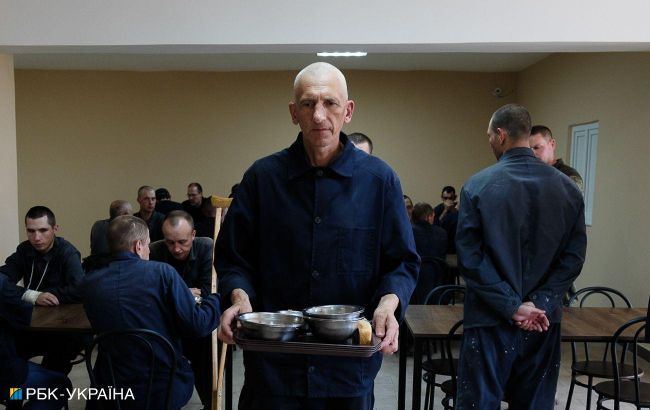 Russian prisoners of war in the camp cafeteria (Photo: Vitalii Nosach/RBC-Ukraine)
Russian prisoners of war in the camp cafeteria (Photo: Vitalii Nosach/RBC-Ukraine)
How one of the camps for Russian POWs operates, what they are engaged in while in captivity, how they ended up in the war, and whether they have changed their stance – read in the report by RBC-Ukraine.
Since the onset of the full-scale war in Ukraine against Russian occupiers, the Ukrainian army has consistently replenished its exchange fund. Hundreds of military prisoners from the Russian Federation find themselves in camps specifically vacated of other detainees.
POWs are treated in strict accordance with the Geneva Convention - they are well-fed, provided with jobs, and their health is monitored. Today, this is no longer done solely to ensure the Russian regime treats Ukrainian captives similarly. Judging by the appearance of those who have been successfully exchanged, Russian camps seem to disregard both the Convention and humanity. Despite this, the Ukrainian side continues to build up an exchange fund and oversee it as a civilized state.
Inspection, medical unit, and barbershop
The camp for Russian prisoners of war is located in western Ukraine and is almost the size of a small village. It features an expansive concrete courtyard with perimeter walls, barbed wire, and observation towers. We are immediately informed that panoramic photography is prohibited, photographing the personnel is forbidden, and disclosing the location is prohibited.
"We will follow the path that the captives themselves take when they arrive here," says Petro Yatsenko, a representative of the Coordination Staff for Handling Prisoners of War, "inspection, medical check, quarantine isolation, barbershop, and so on."
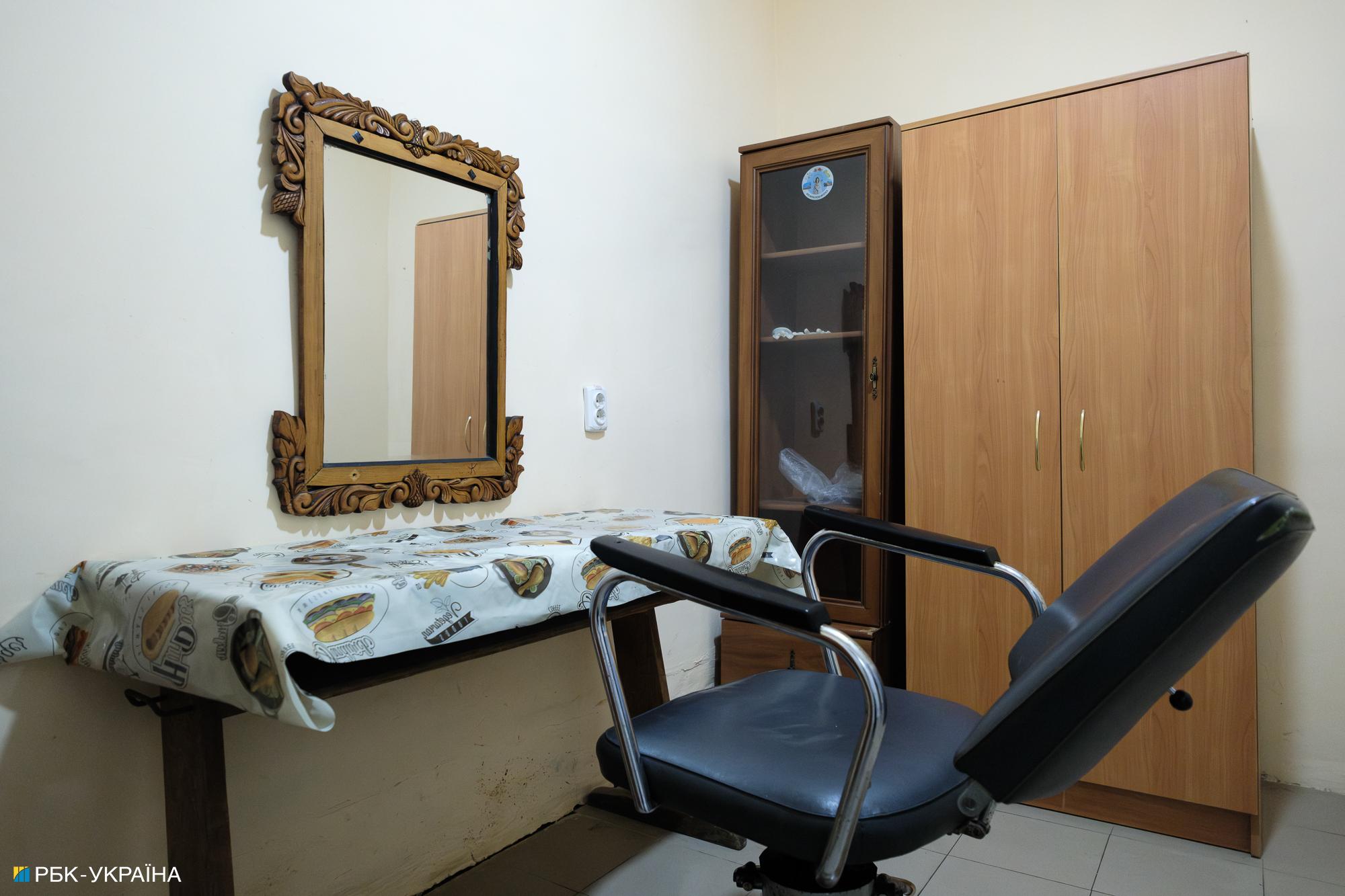
Several journalists smile at the word "barbershop." We will experience and see things here that are unusual for such places. The barbershop turns out to be a small room with a chair and a mirror in an intricately carved wooden frame. It could even be called beautiful, but the captives arriving here are unlikely to notice.
We submit our passports, pass through a security checkpoint, and enter the courtyard. On a section of land, a large Ukrainian coat of arms is planted with yellow marigolds. Next to it stands a Greek Catholic Church of St. George. It's empty.
"They pray here, even those who are not Greek Catholics. The rituals are similar. On Easter, they bake paskas (traditional Eastern bread - Ed.), and priests come to bless," Petro explains.
When prisoners of war arrive at the camp, their rights are read to them first. They are informed about their schedule and activities. They are cared for in the medical unit and placed in quarantine for two weeks. The room for care smells of soap.
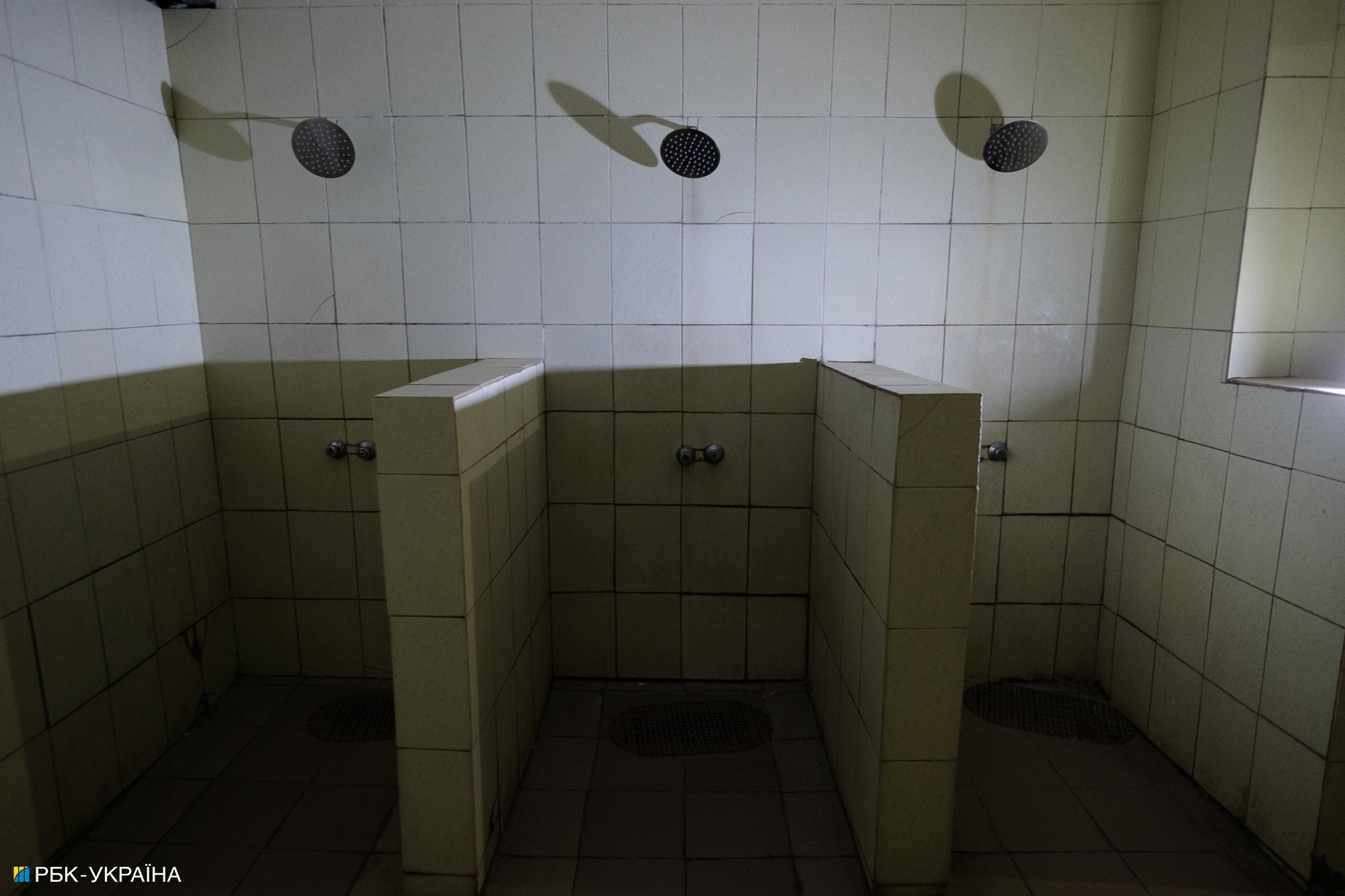
In the next room, captives undress and hand over their belongings. These are placed in bags and labeled. A separate storage room has been allocated for this purpose, with shelves filled with clothing bundles. This room has a strong smell. Prisoners are allowed to keep their personal jewelry. In the next room, they receive uniforms and shoes. All the shoes are made of leather.
"There is always hot water here, the boiler works," says one of the camp employees.
If captives arrive ill, they are treated. When the Wagner soldiers were brought in, those recruited from Russian prisons, many of them had red or white bracelets on their arms. This indicates that the captive has HIV or hepatitis. Such individuals no longer enter the general zones."
We are moving forward - into the quarantine zone. Petro says it sounds strange here, and in a way, it does. But indeed, we are fortunate - on this very day, newcomers have been brought to the camp. While we talk on the street, they are already looking at us from the window. However, as soon as we look at them, they quickly turn away.
In the room where the newcomers sit, there are beds and nightstands - one for each person. The new detainees wear clean dark blue robes and have shaved heads. They hold papers in their hands - a psychological test.
- What's in the test?
- Well, for example: "I'm often told that I'm hot-tempered," "I rarely experience constipation," "In a game, I prefer to win."
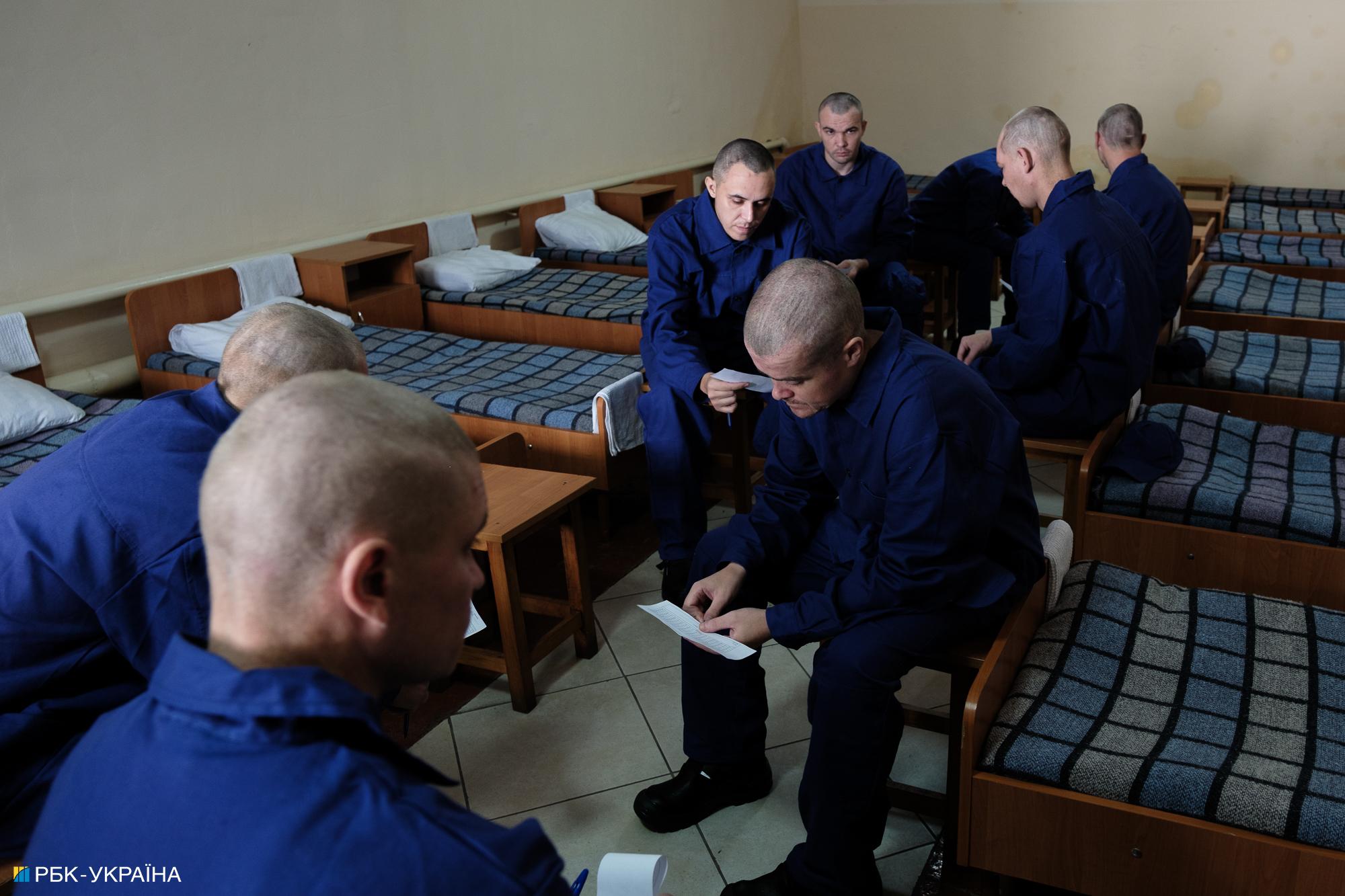
The newcomers appear fearful - they constantly hunch over, hide their heads, and press themselves into their beds, as if trying to disappear. When asked who's from Russia, a few people raise their hands. One of the men looks frightened but doesn't lower his head, and we start a conversation with him. He introduces himself as Kirill, saying he's from the Tula region. He came to Ukraine in late December, served in territorial defense on the left bank of the Kherson region, and surrendered on July 1 near the Antonivskyi Bridge because there were "no options."
- What do you think about Ukraine?
- I think it was pointless for us to start all this. This war. But I don't even know what to tell you now.
Another newcomer is Ukrainian, Yevhen Kalashnikov from Novoazovsk. When the Russians came to his city, he was 14 years old. He keeps repeating that he surrendered and was forcibly taken into the war. He is still holding the test with questions about games and temperament in his hand.
- I specifically left my positions and came to the positions of the Armed Forces of Ukraine. All charges against me were dropped, but I'm still here.
Yevhen spent three days at the frontline. There are many like him here; the record is 6 hours. As we talk, another newcomer enters the quarantine zone. His hand, smeared with green disinfectant, is turned backward.
- A grenade exploded nearby, - the man explains.
Meanwhile, Yevhen has already had a brief interview with other journalists. Finally, he puts the test aside, repeats the same words, and constantly strokes his shaved head.
- They forcibly pushed me into this war, I came and surrendered. The charges were dropped. They were supposed to release me. I chose my side; I have no regrets.
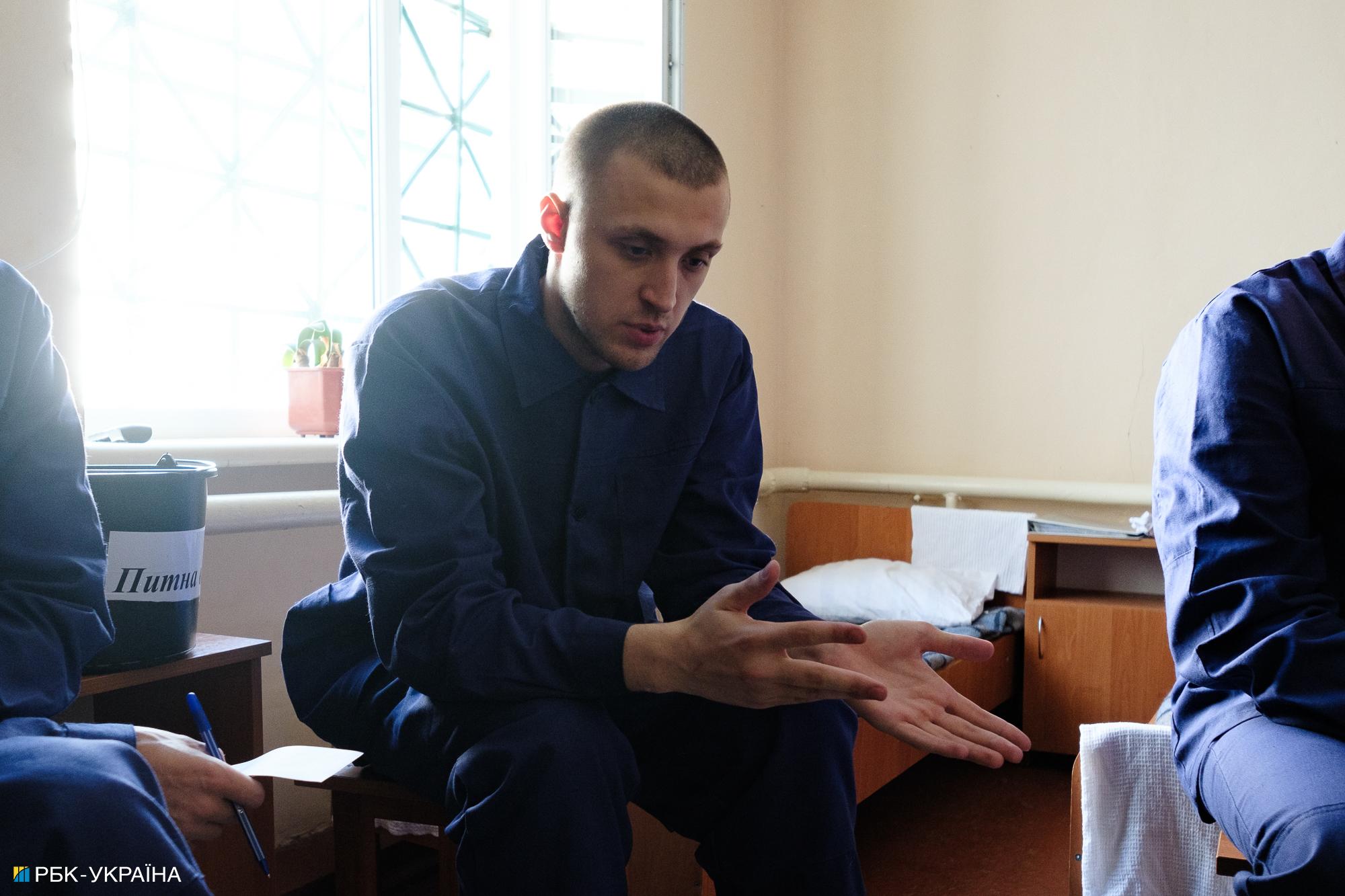 Military captive Yevhen from Novoazovsk
Military captive Yevhen from Novoazovsk
Outside, we talk to several staff members and relay the words of the new captives. They smile. "We hear this legend often here. They surrendered, didn't shoot, didn't kill anyone. They're all 'innocent.'"
We are led to the infirmary. It's a small two-story building with wards and an examination room. In rooms with eight beds each, men in striped robes lie down. Many have crutches by their beds. We're allowed to speak with the detainees if they wish. The "patients" behave rather politely and answer questions, but after a minute into the dialogue, it becomes evident how senseless this conversation is. For instance, Russian Alexey joined the war in Ukraine to "repay the debt to the homeland." He could never explain what this debt was or how it related to Ukrainians.
- Do you understand who attacked whom?
- Well, how to say, attacked... We, by ideology, came to defend the people. At the conflict's beginning, we weren't here when the whole situation happened in Ukraine. There were shelling in Luhansk and Donetsk regions.
- Shelling by whom?
- Well, I don't know. But it was shelling from the Ukrainian side.
While he lies and talks, his fingers nervously tap on his abdomen, likely not from fear or shame. Most probably, Alexey genuinely doesn't know who shelled Donbas, so at this moment, he's actively pondering what to answer. Most of those in captivity don't dwell on such questions; they call themselves "ordinary people" and consider war a grand politics they don't understand. Repaying their "debt to the homeland," they lose limbs, eyes, and consciousness. At 26, they look like they're 40 but keep asserting that politics is for the "big people," and that they are just small. Alexey doesn't even want to understand what has been happening in Ukraine all these nine years. When asked if he knows that Luhansk and Donetsk are part of Ukraine, he says no because people "voted" differently.
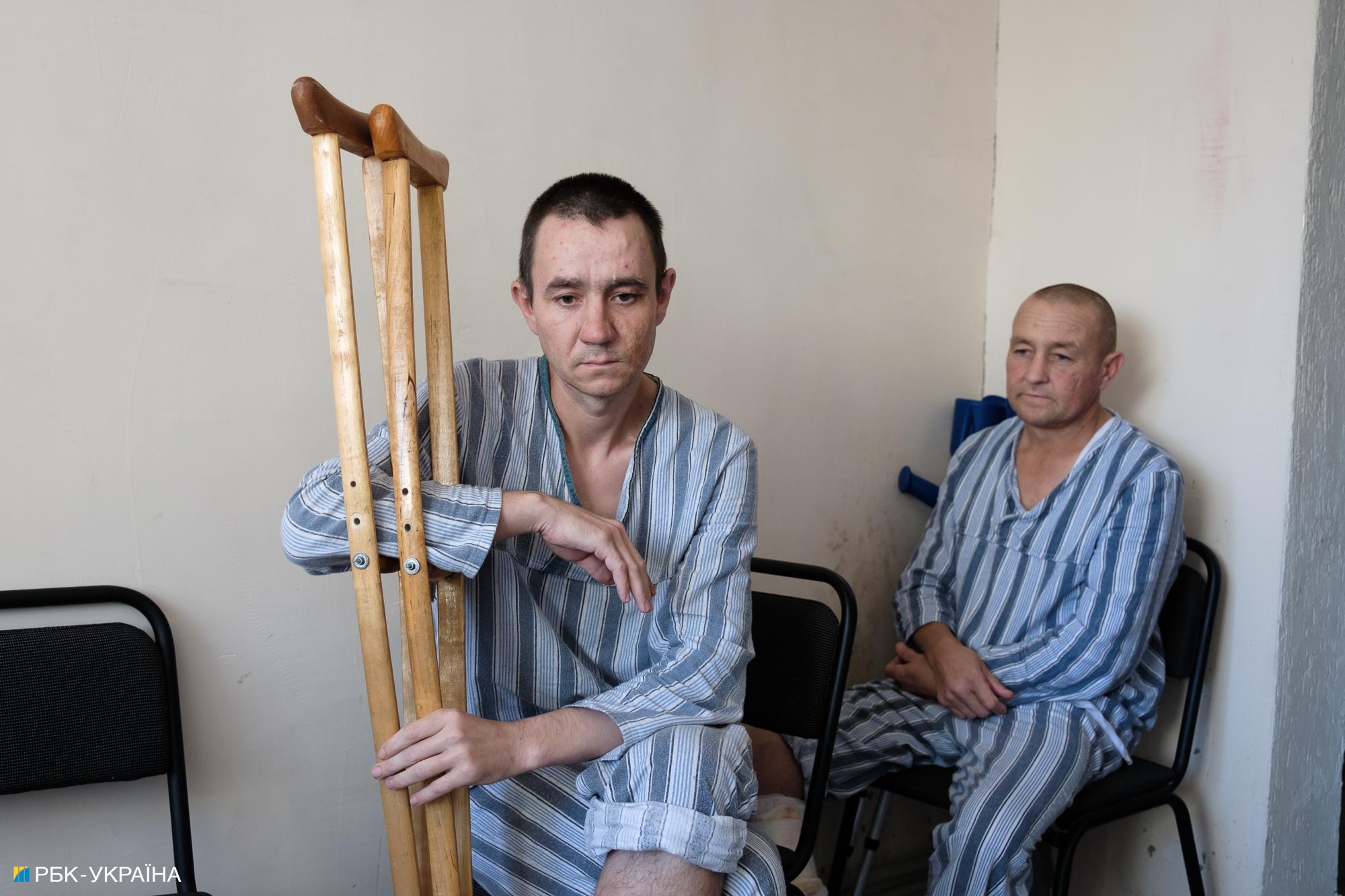
"I stole ten bottles of vodka and candies"
Lunchtime arrives, and we are led for checking. The captives are lined up in three rows in a wide concrete corridor on the street. On the wall opposite the men, portraits of Ukrainian hetmans, the coat of arms, and the Ukrainian anthem are displayed. The captives do not sing our anthem. When this practice was attempted, human rights organizations labeled it as cruel, and the singing of the anthem was abolished. The extent of truly cruel practices implemented in Russian prisons toward Ukrainian military personnel and human rights activists perhaps remains a matter of speculation.
We are led to the dining area, but first, we enter the "store." It's a small room with counters filled with sweets, canned goods, soda, and household chemicals. We are told that each prisoner has their own account where their relatives can send money through intermediaries in Ukraine. Additionally, prisoners of war work and receive from 10 to 15 hryvnias per working day. They do not receive cash in hand.
In the dining area, the captives enter in groups and approach the sinks with mirrors above them. While the men wash their hands and dry them with towels, none of them raise their heads or look at themselves in the mirror.
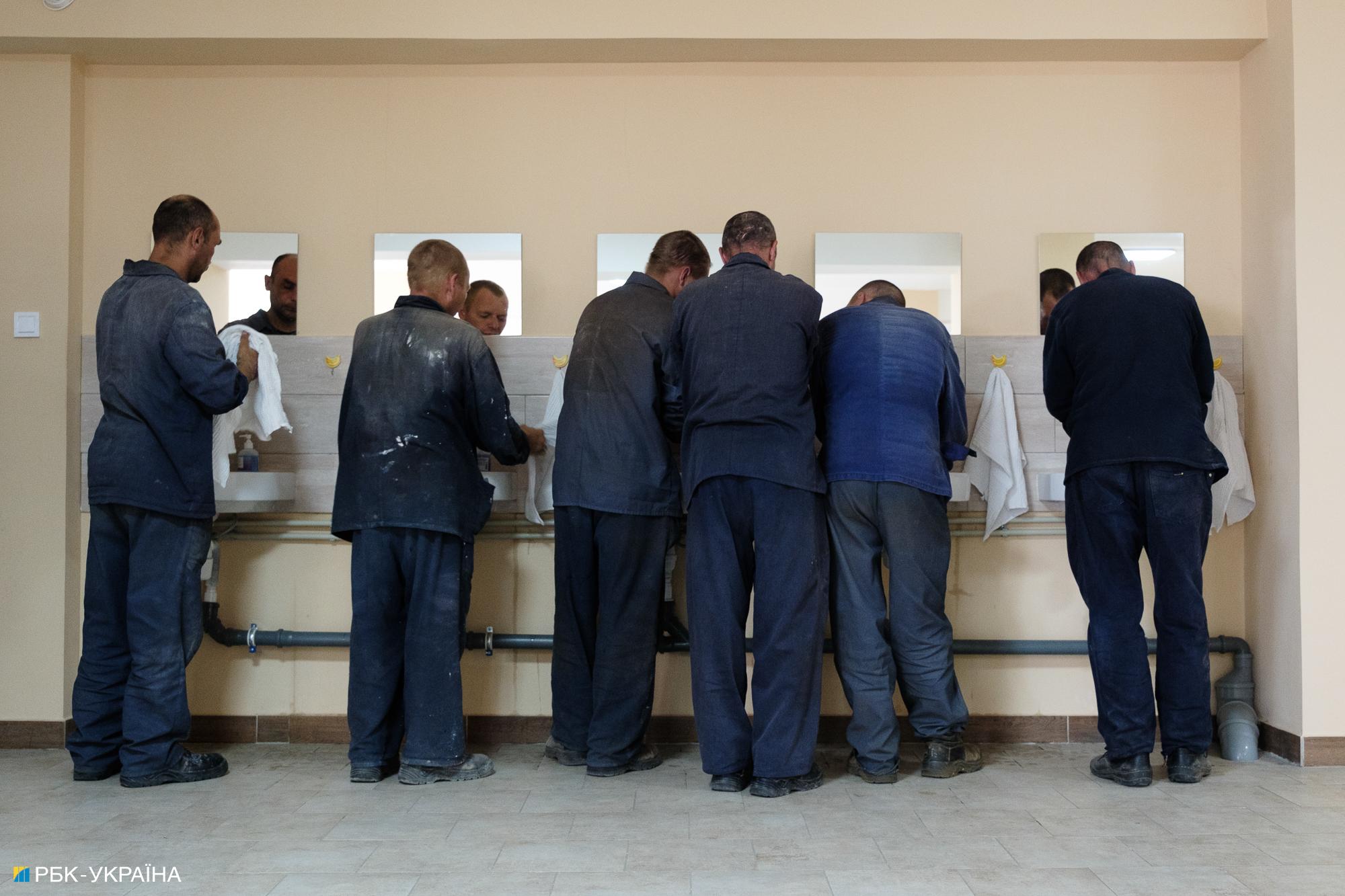
Today's lunch consists of borshch, meat porridge, cabbage salad, and a quarter loaf of white bread. The captives take aluminum plates on trays and sit at the tables. They eat quickly, staring at a single point and not conversing with each other. "They're probably embarrassed in front of the journalists," says one of the staff members. Lunch is distributed to them by attendants in white disposable gowns and caps. After lunch, each group of four stands up and says in unison: "Dyakuiemo za obid" ("Thank you for the lunch" in Ukrainian - Ed.). "Remembering a few words in Ukrainian isn't difficult," a camp employee remarks with a smile.
The food looks hearty - a layer of fat on top of the borshch, and the porridge generously coated with butter. It's hard not to draw parallels between how Ukrainians return from Russian captivity and how they eat apples with expressions on their faces. Frankly, these parallels are evident everywhere, starting from the room with the scent of soap and ending with the mirror in an ornate frame. There's no sense of hopelessness and despair in this camp if we exclude its residents. Even the residents themselves don't appear hungry and exhausted unless you look at the former prisoners.
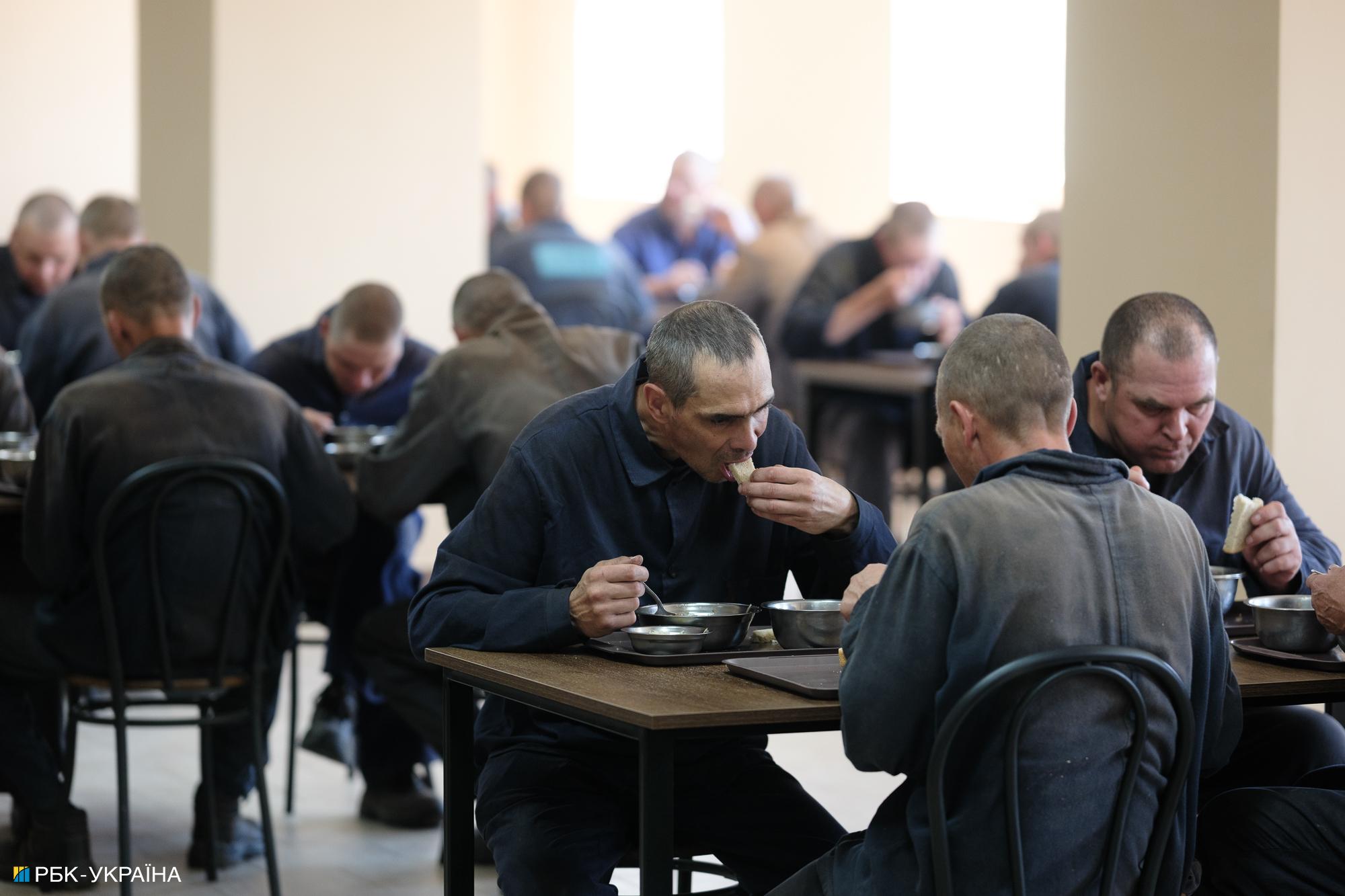
We speak with one of them in the recreation room. It's a small room with a television, books, and a chess set. There are four people in it; one immediately leaves as we enter, but the other three agree to talk. The first to greet us is Andrey. He's from Volgograd and ended up in the war from prison.
- What were you imprisoned for?
- For shoplifting. I stole ten bottles of vodka and candies.
Andrey shows the size of the bottles and when asked if he wanted to drink them, he shakes his head and smiles, revealing his darkened teeth. He got five years for shoplifting. "In Volgograd, they have a severe way of sentencing," Andrey adds, a bit somberly.
Another captive, Grigory, talks with us, leaning on his crutches. His leg, encased in a cast, is swollen, and his nails have turned black. Grigory lived in the Far East, did odd jobs, and ended up in the war due to a conscription notice.
- Do you understand that Russia attacked Ukraine?
- No, we didn't think so. It's like... Russia annexed Donetsk, Zaporizhzhia, and Luhansk. We were on the defense. It wasn't forced.
Grigory calls the war "politics." Neither he nor those sitting with him, even as they watch the television, can recall what happened on February 24, 2022. A man named Erik shakes his head and says, "I don't even know." Speaking with them, it's hard to tell if they're being deceitful or if they truly don't understand what's happening.
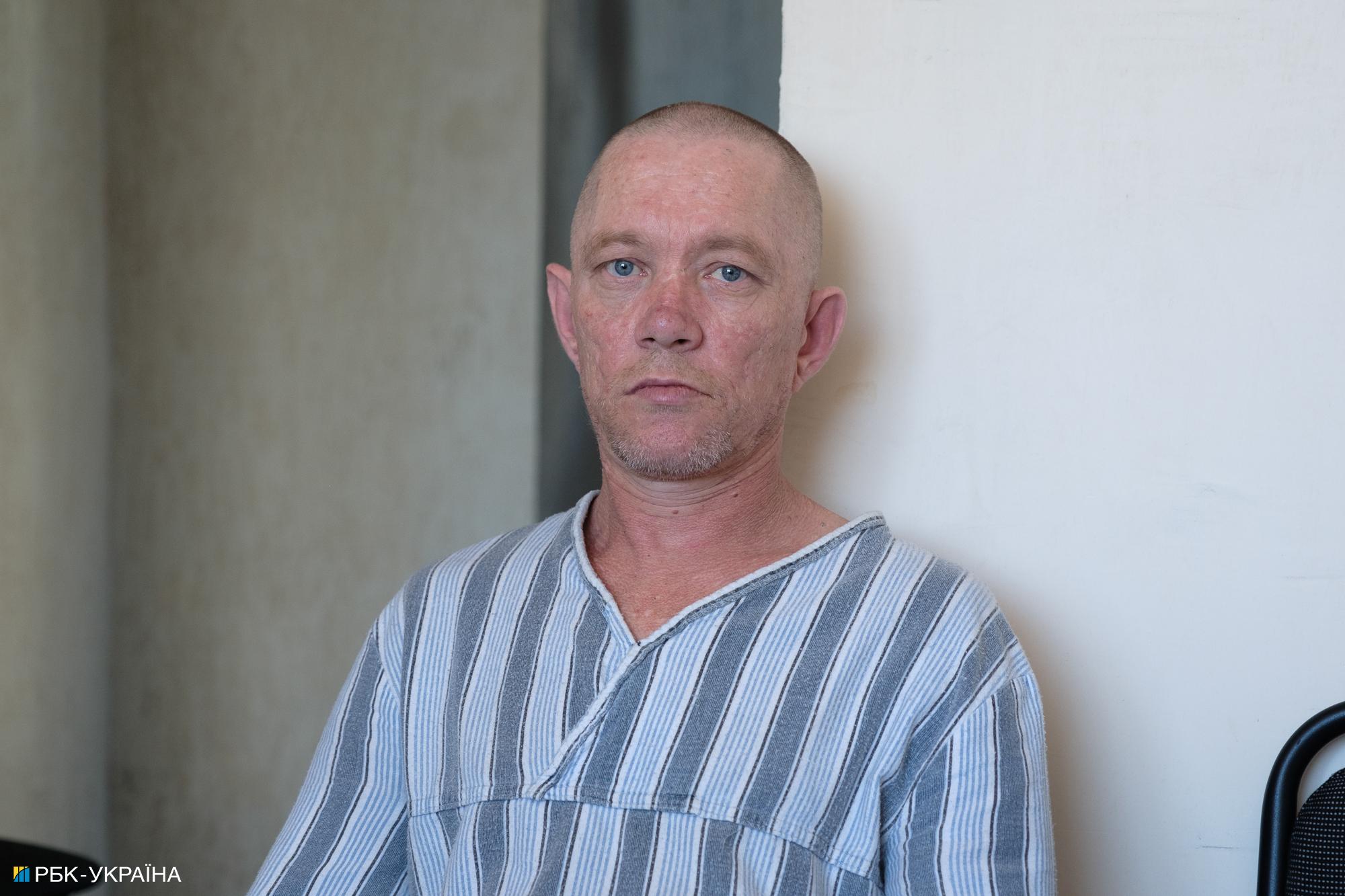
Military captive Andrey from Volgograd
They keep repeating that war is bad and that there should have been negotiations. When we ask them, if those who came to their home and said they no longer live there would start negotiating, the captives respond that they wouldn't negotiate. They would start evicting. But even here, they don't see the obvious parallels.
"Civilized Nazis"
We are shown places where captives work. They have several workshops - in one of them, they make gift bags. Men with tattoos faded by time, bandages on their heads, dressed in blue overalls, look very foolish and strange, carefully folding shiny raspberry paper with colorful confetti.
We approach one of the captives; he has a large dragon tattoo on his arm. He introduces himself as Artyom and at first seems quite polite, constantly smiling and nodding. When we ask him if he thought we were Nazis, he answers - yes. Has his stance changed? No.
- Are you treated well in captivity?
- Yes.
- How do you think Nazis would treat you?
- You are civilized Nazis.
Artyom says all this with the same smile and nods his head just as politely. He took part in Storm-Z and went to war solely for ideological reasons. Now Artyom is making gift bags in captivity.
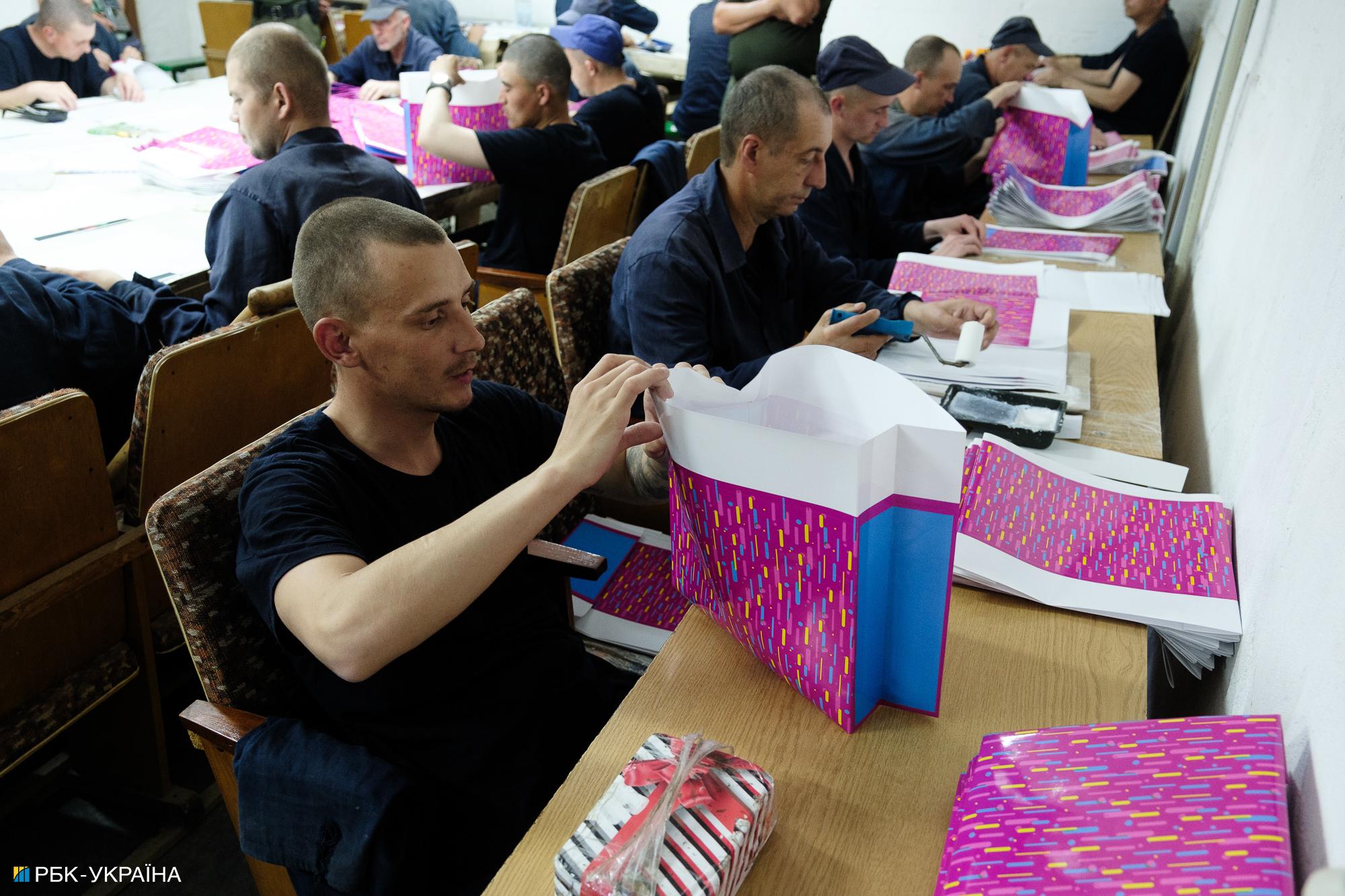
Military captive Artyom from Kemerovo
In the next workshop, holes are made in the bags, and blue shoelaces are threaded through them. One of the captives - a man of a rather imposing appearance - greets us and nods slightly. He doesn't look oppressed or scared like most of his "colleagues." On the contrary, he seems to fit into this place. We ask why he works in the "bag" workshop and not in the sawmill, for example. He points to his side and says he has a bad back for the sawmill. This captive turns out to be a Ukrainian from Donetsk.
When asked about ideological reasoning, he sighs and asks where we are from and when the shelling started in our city.
- Donetsk was shelled for 9 years.
- Who shelled it?
- Armed forces. Ukrainian.
In this camp, there are many Ukrainians from Donbas who went to fight for the Russians. Some of them, like Yevhen from Novoazovsk, say they were forced. And some, like the man from the "bag" workshop, believe they were shelled by their own army. Most of them can't answer questions about what was damaged due to the nine-year shelling or how many died. They perceive these questions aggressively.
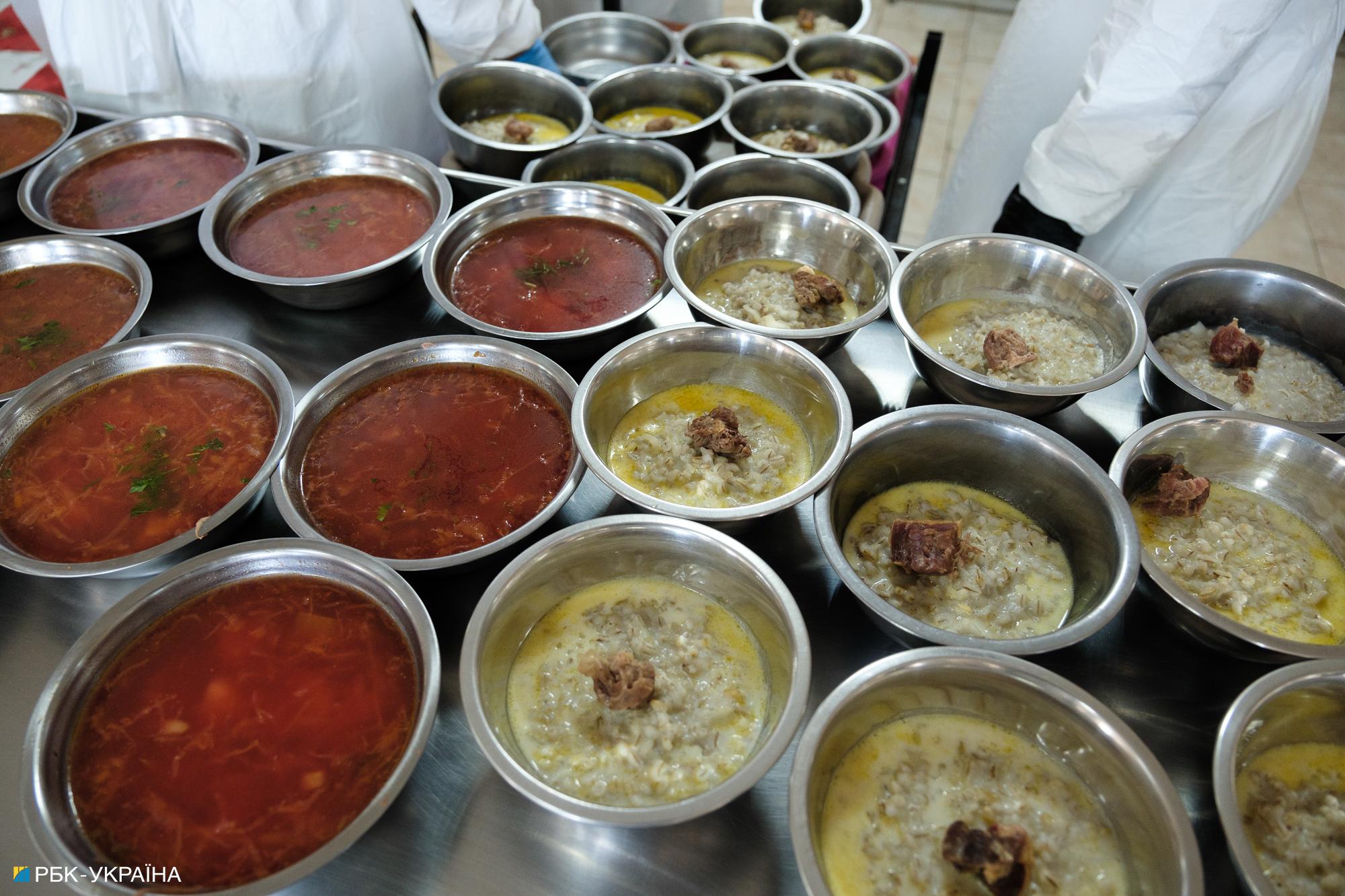
Meals in the POWs camp
In the next workshop, the captives weave chairs and sofas. The same ones that later stand on cafe terraces and someone's country cottages. Talking to them becomes less appealing; they become tedious and monotonous. They all have similar, expressionless faces, each showing an expression of silent acceptance. Strangely enough, they seem to wear these expressions quite naturally.
We step out into the yard and see that one section of the land is densely planted with zucchinis. "Ukrainians always have something to plant," says the journalist. The last stop of the "tour" is a room where captives can call their relatives. The call itself lasts for 15 minutes, and they can make a call in turn, on average, about once every two weeks. "Ours [Ukrainian captives in Russia] are not allowed to make calls at all," Petro points out.
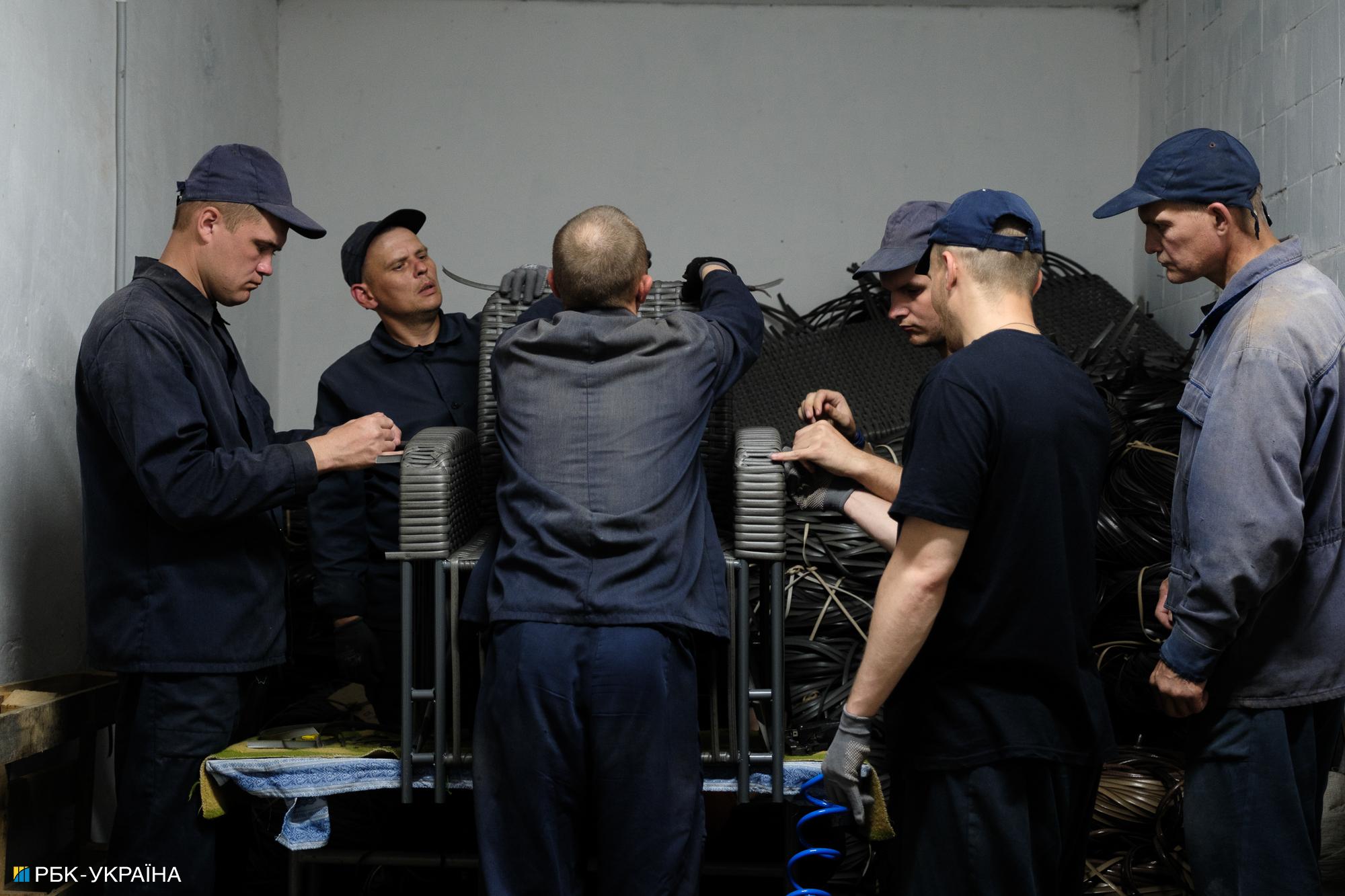
We climb to the third floor of another building, which looks worse than the others - the ceiling and walls are roughly plastered, and the long corridor is poorly lit. Along the wall stands the newcomers we talked to at the beginning. One of them, the shortest, constantly looks out from under the brim of a uniform cap, while others seem frozen.
- Who wants to call? Who remembers the number by heart?
The first one from the line is called. He is led into a small room, and we follow closely behind. He sits down by the phone, dictating a number that the operator dials. Through the loudspeaker, they inform him that his conversation will now be recorded, and the dial tone begins. We freeze with our cameras; the captive also freezes – we listen to the prolonged dial tone. Finally, from the loudspeaker comes the word "Hello." For several seconds, the captive and his relative check if they can hear each other well, and then the young man announces that he is in captivity.
- Where?
- In Ukraine.
The woman on the other end of the line is almost incomprehensible, but from her tone, it's clear she is not shocked. We don't want to listen to the conversation; we've heard dozens of such dialogues. While standing in a dimly lit corridor, the captives also remain still. All except the shortest one. When the previous one finishes talking and they ask them again who remembers the number, he shakes his head, peering out from under the brim, and quickly says, "Why me, why me right away? Isn't that guy next in line?"
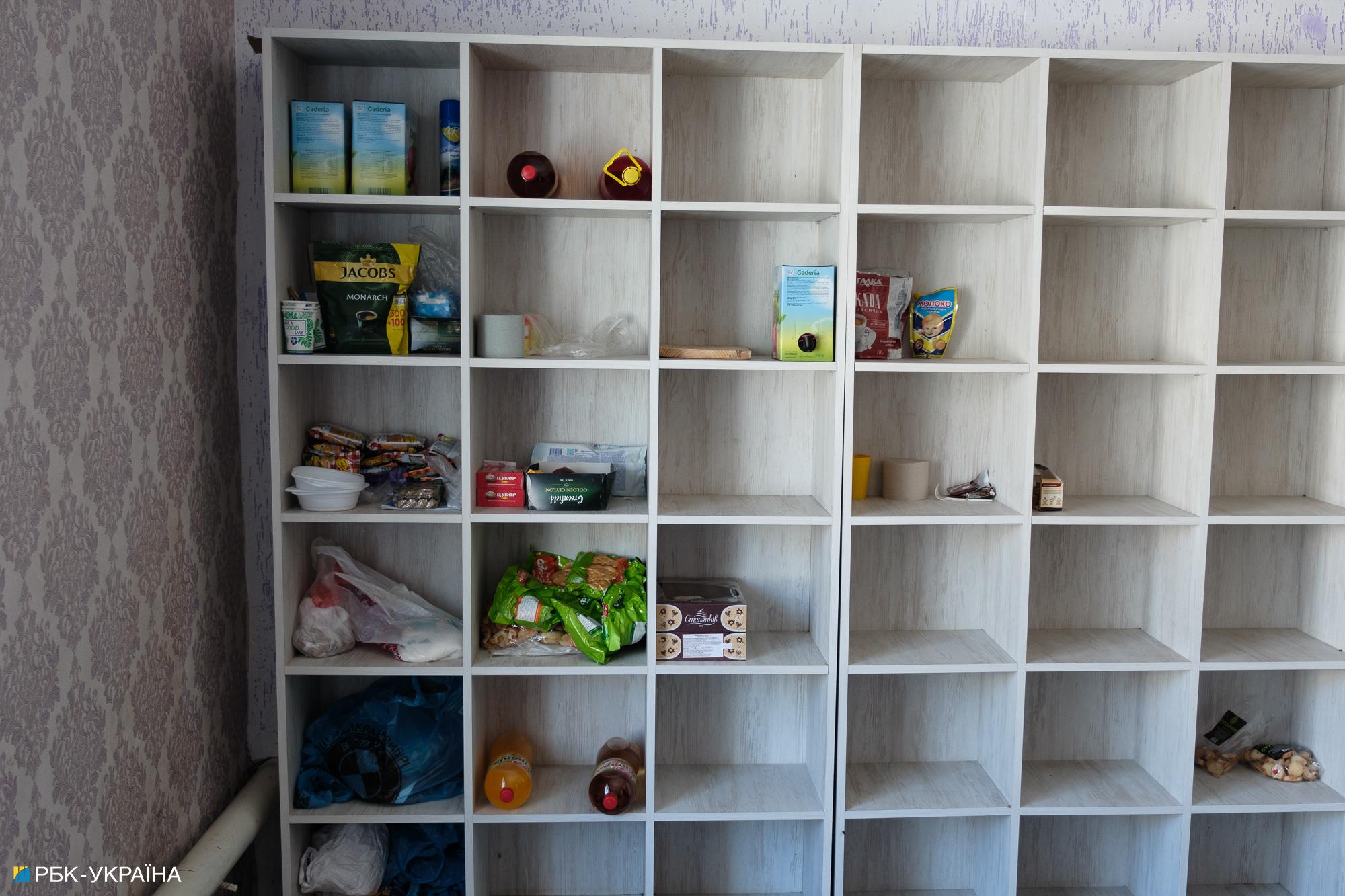 Food shelves in the room for the rest
Food shelves in the room for the rest
The next one enters the room. The loudspeaker isn't turned off; at first, we hear the dial tone, and then a fast dance song starts playing. Through the loud rhythm, the sounds spread throughout the corridor. We and the camp employees start laughing, and a few people even dance a little. Only the captives don't dance.
Change of prison for "Freedom of Russia"
Before we leave the camp, we are allowed to speak privately with one of the captives. We specifically request to meet with a Russian. After a few minutes, a stocky man who remotely resembles Yevgeny Prigozhin is brought into the room with two couches covered in colorful blankets. He sits on a chair and clasps his hands in front of him. The man is named Yaroslav Yaroslavtsev, he is 45 years old, and he is from the Tver region. He ended up in the war from prison, sentenced for causing a fatal accident. While talking about "serving his punishment," Yaroslav smiles and squints his eyes.
- We went to war with the Ministry of Defense. We didn't go with Prigozhin. We were afraid of being deceived and not paid, it's the private military company after all. But it turned out the opposite.
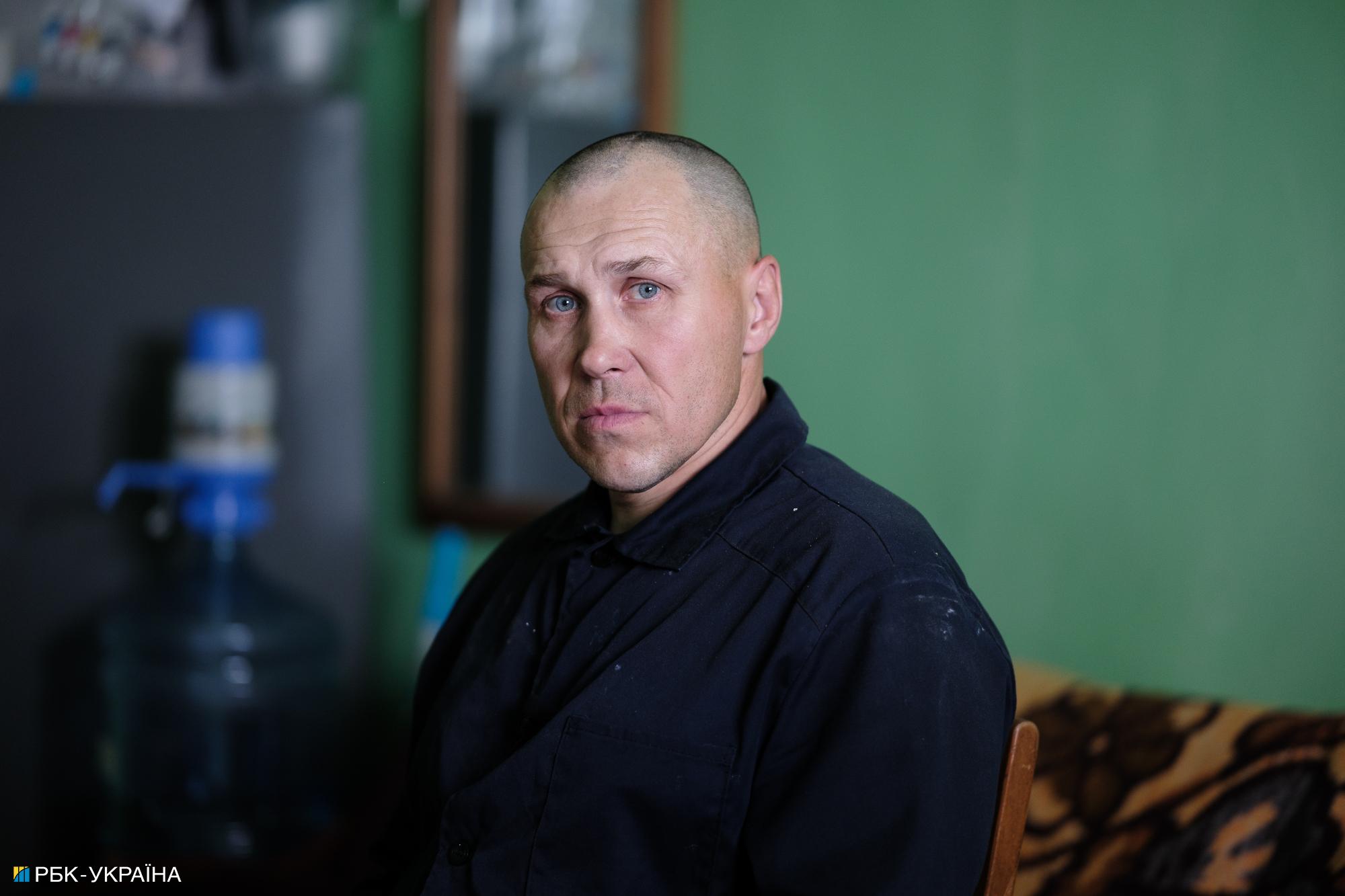
Military captive Yaroslav, Tver region
Yaroslav's face comes alive and changes as he speaks, and he freezes when he listens, making it difficult to understand his reaction to questions. The captive says that they were taken from prison to war "voluntarily compulsory," and their training lasted only 10 days. They were equipped with Kalashnikovs and sent into battle.
- How did you become a captive?
- I sadly became one. I ended up on the front flank. I didn't fire a single shot. I had no way out – either lie under mortar fire or be killed by machine gunners shooting us in the back.
Throughout the conversation, Yaroslav repeats several times that he didn't shoot at all. "My rifle was covered in oil," he adds details to make his words sound more convincing. Comparing captivity and prison, he says captivity is better because, in prison, they treated him – a Slav, as he emphasizes – as if he weren't at home. And the prison is in Bashkortostan.
- Not only were they treating Russians there like that, but also Slavs ... And here I am in my own country, and they tell me, "Go to Russia!"
Yaroslav is genuinely indignant about this; for the first time in the whole conversation, he raises his eyebrows, rounds his eyes, and even raises his voice slightly. He is convinced that the Bashkirs are Russians, and Bashkortostan is his country. Neither the prefix "stan" nor obvious differences raise any questions for him. He talks about the Kremlin almost as indignantly but adds a few theatrical pauses to his speech.
- History repeats itself. There's a tsar, and there are oprichniki. The oprichniki are carrying out the tsar's will. If the tsar believes it's right, you understand who I'm talking about. If something is needed by Vladimir Vladimirovich Putin, he solves it through his structures. That's it.
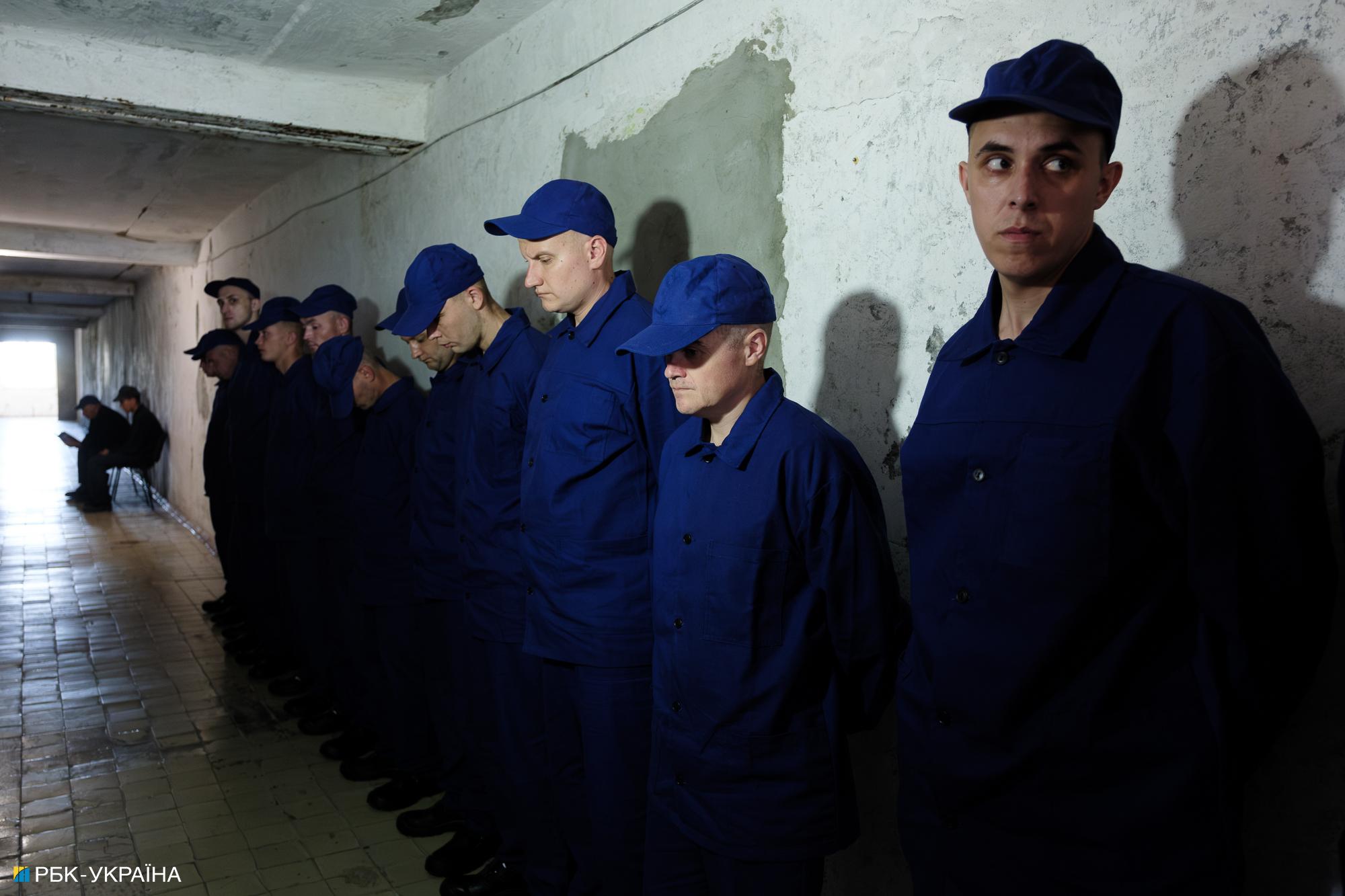
While we talk, it's apparent that Yaroslav is actively burning bridges, and, as it turns out, this is true.
- Are you planning to return?
- I'd rather stay.
- In what capacity?
- Well, like... Being useful. Suppose there's the RVC (Russian Volunteer Corps).
RVC or the Legion "Freedom of Russia" – Yaroslav doesn't really care what it will be. He would like to get political asylum, but he understands that he won't be granted it. The man doesn't hide that he doesn't want to go to Russia because he'll face prison again. But he calls it one of the reasons. The main reason is to end the war.
- Are you ashamed before Ukraine?
- I'm ashamed that I believed in something that doesn't actually exist. I haven't done anything wrong to Ukraine. But... It happened, it happened. I believed that...
He doesn't finish the last sentence – he doesn't know how to phrase it. Instead, he raises his hands and smiles – this time, helplessly.
We say goodbye to the staff and leave the camp. For the captives, there's a schedule – work, then dinner, procedures, and sleep. Next to the word "sleep" in the schedule, it says "continuous." An employee explains to us that it's only interrupted by alarms. According to the rules, if an air raid alarm sounds, the captives are woken up and taken to shelters. The wounded are carried on stretchers.
- And it's not even our fault. Let them thank Putin.

